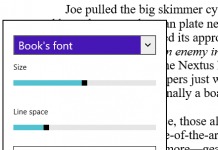 That’s what Kirk Biglione says in his MediaLoper article. According to Kirk, Publishers Lunch reported that many large publishers won’t participate in B&N’s LendMe program for fear that lending will somehow hurt the market. As a matter of fact they required B&N to reduce its lending program from unlimited to just a maximum of 14 days, and then for only one book at a time. All this, of course, completely ignoring the fact that readers regularly lend their paper books to others. Kirk says that lending seems to be the equivalent of Amazon’s text to speech problems.
That’s what Kirk Biglione says in his MediaLoper article. According to Kirk, Publishers Lunch reported that many large publishers won’t participate in B&N’s LendMe program for fear that lending will somehow hurt the market. As a matter of fact they required B&N to reduce its lending program from unlimited to just a maximum of 14 days, and then for only one book at a time. All this, of course, completely ignoring the fact that readers regularly lend their paper books to others. Kirk says that lending seems to be the equivalent of Amazon’s text to speech problems.
If publishers want to get the prices of ebooks up, why cripple them. As Kirk notes, the perception of an ebooks’ value is what sets pricing. The more features you allow, the more you can charge. But I guess this isn’t understood very well by the powers-that-must-be obeyed.

































If Publishers don’t like lending (even one person to another), where does that leave libraries?
Zumaya’s books are available via B&N for the Nook. Please lend early and often. They’re also cheaper. I’d say “and better” but that being a subjective opinion I’ll leave it up to those who choose to read them.
It’s insane, publisher’s not allowing book sharing, plus the very limited amount of time to borrow a book – 14 days, and you can only borrow once? What are they thinking? Why are they doing so much to encourage pirating?
Okay, first of all, like Zumaya, BooksForABuck.com does not disable sharing, or text-to-speech, for that matter. However, I think there are significant differences between lending a hardback and lending an eBook.
1. If you lend a hardback, you might or might not get it back. Let’s be honest…book borrowers may be your friends, but they’re notorious for not returning books. In contrast, eBooks automatically return after the set lending period.
2. If you lend a hardback, it inevitably gets coffee stains, bent pages, more wear on the spine, etc. Four or five lends and you’ll need to buy a new copy for yourself. If you lend an eBook, the book you get back is as perfect as the original. It’s as if you printed out a fresh beautiful copy every time the book changed hands.
So, I can understand why publishers don’t think of the lending feature as the equivalent of lending out paper books.
Rob Preece
Publisher
Rob, Rob, Rob…..
1. If you lend a book on the nook it could easily be set to not release the book to the owner until it is returned. So are you saying part of you business model is contingent on consumer loss?
2. Again you seem to be depending on loss for profits? Nothing is forever, not even copyright. People do lose e-books e-pictures e-documents e-mail etc.. Yes destruction would be lessened.
Yes there are differences, that much is true. There are differences between a Polaroid and a 35MM and a digital photo. There are differences between VHS, Beta, DVD and DVR recordings. There are differences between reel to reel, 8-track, cassette, and CD.
The differences are called progress.
E-books are a natural progression. Those whom find a way to add value to their content will have businesses that survive, those who clutch madly to it like a child proclaiming you can only use it how they want, will have their business die empty and alone. The record industry has been drug kicking and screaming into the mp3 arena since 1994. The movie industry into the recording arena since the late 70’s Must the e-book industry plunge its head into the sand and take the same path?
The loss of loss is something that will hurt but only a little.
From the Nook faq:
. Can I lend eBooks from my nook?
X Yes. With our new LendMe™ technology, you can now share from nook to nook. But it doesn’t stop there. Starting Nov. 30th, you can lend to and from any device with the Barnes & Noble eReader app, including PC, Mac OS®, BlackBerry®, iPhone™ and iPod® touch. All you need to know is your friend’s email address. You can lend many of your eBooks one time for a maximum of 14 days. When you use our LendMe™ technology, you will not be able to read your eBook while it is on loan, but you always get it back.
______
Note:
“You can lend many of your eBooks one time…”
No need to worry about coffee stains or bent pages if you can only lend a book once. And that’s assuming it is aloowed at all.
Frankly, the feature is meaningless to start with.
The Kindle’s “send a sample” serves the same promotional value (and that is all either feature really is–a promotional tool) and it at least lets you carpet-bomb your friends and family with your latest literary find.
The publishers are just paranoid; if people really want to pool their ebook buys all they have to do is simply authorize each other’s readers to a common account. ADE allows multiple devices per account, remember?
Much ado about very little.
I’d like to ask those same publishers how they feel about people sharing print books with one another. Or for that matter, as Jeff Scott said above, what about libraries?
I guess publishers are actively encouraging piracy by pulling stunts like this. Have they learned nothing from the music industry?
Unfortunately, this shows that once again, publishers are making their buisness decisions for a world where publishers wished they lived in as opposed to the one they actually live in.
Each time they cripple a feature, restrict the devices where you can read a book, or otherwise try to limit by fiat what technology is able to do with books; they ignore the reality that their future depends on cultivating good will with a generation of new readers who are already more than a little inclined to turn to the darknet or to turn away from reading all together as a pastime.
Publishers need to realize that if readers can’t borrow a book from their friend, they might decide its easier to just download a pirated copy.
Yawn. Just one more reason to stick with real books.
@rahlquist: ‘lending’ on the nook *is* set up so that the owner has no access to it while the borrower is reading it.
onward. how useful is that two-week lending period anyway? i know for a fact that i may have finished reading a book lent to me by a friend *maybe* once within 14 days. i just have way too much going on; and when the friend lends the title, i’m usually in the middle of something else. it’s a useless feature, even if publishers *weren’t* being idiots about it and making their customers do all the work of remembering which titles can and cannot be lent.
i’ve mentioned in other comments that publishers are stupid. at risk of sounding like the ‘übertroll’: publishers are stupid. their behavior is *highly* weird. it’s almost as if they’d forgotten that their industry was *threatened by the decline of reading* before this whole e-book thing hit. now they seem to feel threatened by people’s desire to read.
to succeed when all of this shakes out, electronic books are really going need to end up with most of the same features of print books. which — really notably — have most of the same features *as each other*: no “ok to lend this one, not ok to lend that one”; no “text to speech works on this one; doesn’t work on that one”; no “this is a static pdf, so i can’t take notes or underline, that one’s been converted for my kindle, so i can do both”; no “this one started as a pdf, so tables are f*cked, that one started as html, so tables are readable.”
how can an entire industry be so completely divorced from *how its products are used*? i would suggest that publishers only care about selling books — and don’t give a rat’s bottom about whether people actually read them, except incidentally, as one of many things about the packaging that will get the consumer to shell out the dough. they definitely know that book people tend to buy far more books than they’ll be able to read in a lifetime. what they still haven’t really figured out, is that e-book book people do the same things — except that on top of the original behavior, they also *re-buy* in electronic format texts they already own in print.
duh.
asphalt: you ask how?
Easy; those folks don’t get out much. They like their cozy little glass towers where everybody comes to them.
You live long enough in a godlike environment and pretty soon, you start thinking you *are* a god.
As Mr McHale said, the publishers set their policies for the world in which they are godlike arbiters of everything that gets published, instead of a world where they are technologically illiterates competing for the dwindling interest of the tech-savvy masses.
Its alright, though, guys.
There’s no need to sweat it.
Those that bet their companies on their ability to screw the customer invariably get screwed in biblical fashion by competitors who figure out how to get consumers on their side.
What goes around and all that…
@felix: the most hilarious thing about crippling of lending, is — hm. how many nook-owning friends do *you* have? (answer: 0. nobody even *has* a nook, ’cause they haven’t *shipped* yet.) i’ve had a kindle since february, and i have exactly *one* friend who has one.
and: if you’re a publisher, don’t you *want* to encourage as many people as possible to own the devices? and: wouldn’t your friend saying, “geez. i’d lend you my copy, if you had a nook to read it on…” instill in you some form of desire to *buy a nook*? and wouldn’t the short lending period make you say, “no thanks, i’ll just buy it if it’s that great.” it sounds completely insane, but *that really is how humans behave*!
i swear. those publisher people must hit their heads on the cupboard door pretty hard before they go to work every day.
asphalt,
It actually seems they aren’t interested in selling books – they are just interested in moving around and selling small chunks of paper. They don’t care what is in it.
It’s funny for those of us that have followed the music industry’s fight over mp3 technology to now see the exact same thing happening with eBooks. Here’s a note to the publishers – consumers will end up using their eBooks how they want.
There WILL BE a large pirated market for eBooks, that’s just a fact of life. In fact, ThePirateBay.org already has a section for eBooks. However, publishers could limit this pirate market by letting consumers use their eBooks the way they want.
Here’s a scary thought (for publishers, at least) – why not set up a “lending community” online where eBook owners can lend and borrow books from strangers in an online marketplace? Publishers wouldn’t like it much, but I guaranty it would be a big hit with avid book readers.